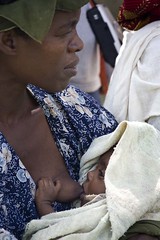- in Breastfeeding by Alexis Rodrigo
- |
- 1 comments
It’s World Breastfeeding Week – What’s The Emergency?
This whole first week of August is World Breastfeeding Week. This year’s theme is “Breastfeeding – A Vital Emergency Response: Are You Ready?”
The theme reminds me of a family who was stranded in their car in the snow for over 9 days. They were a family of 3: Dad, Mom and an infant. I can’t remember exactly how old, but about 7-9 months old.
Anyway, that whole time, the Mom breastfed her baby and drank melted snow herself. As can be expected, the baby survived with nothing worse than a nappy rash (or maybe not even that, I’m not sure. Please post a comment and correct me if I’m wrong).
Had that baby been formula fed, she would have gotten terribly dehydrated. Her Mom would have had no choice but to give her plain water the whole time. Had that baby been formula-fed, this story would have had a more tragic ending (her Dad went on foot to try and find help but ended up lost and died).
This story is magnified in emergency situations of larger proportions: earthquakes, floods, tsunamis, famine….
As with any emergency, the key is to be prepared. This is why the World Breastfeeding Week’s Theme includes the question, “Are you ready?” “You” refers not only to mothers and their families. It also refers to:
– communities, to give appropriate support to breastfeeding mothers so they can continue to breastfeed should an emergency strike
– rescue workers, so they can reunite babies with their mothers and the breastfeeding relationship can resume
– emergency response groups, so they can meet the needs of babies and young children without accepting donations of infant formula and other breastmilk substitutes
– counselors, so they can help traumatized mothers cope with the situation and not adversely affect their breastfeeding
– breastfeeding mothers, so they can help babies who have lost their mothers – whether temporarily or permanently – by sharing their breastmilk
But there’s another side to this story.
The absence of breastfeeding very often leads to an emergency. It may not be an emergency that affects the whole community, but it certainly affects the child who is being deprived of breastfeeding, and the child’s family – both of whom live with the consequences of not breastfeeding.
These consequences include:
– getting sick more often and to a worse degree, than their breastfed peers
– being more likely to develop allergies
– losing IQ points
– having an increased likelihood of developing diseases such as cancers, diabetes, etc., in their adult life
In these two ways, breastfeeding truly is an emergency response.
If you’d like to find out more about World Breastfeeding Week and how you can help, visit www.worldbreastfeedingweek.org
What are you doing to support breastfeeding? Please share by posting a comment below.
![]()
PS: If you’re on Twitter and would like to help promote World Breastfeeding Week, you can do so by adding a Twibbon on your avatar. It’s super easy. Just go to https://twibbon.com/join/World-Breastfeeding-Week for the step-by-step instructions.
If you liked this post, submit your email address below to get new posts by email:

